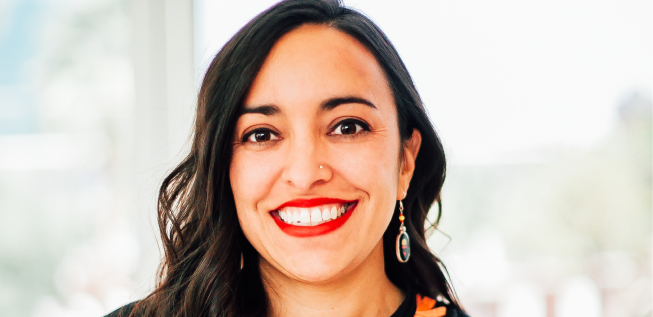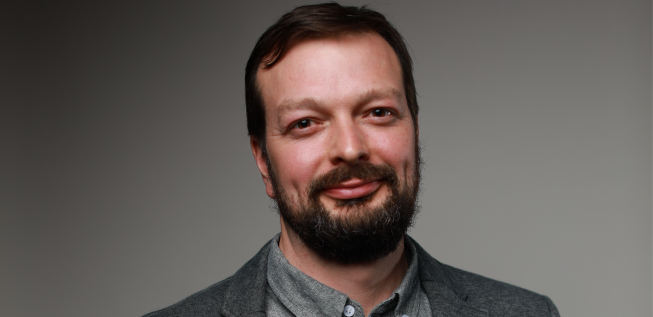Meeting the Moment with Sarah Audelo

In 2020, the intertwining and inequitable systems, from health and education to legal and democracy and beyond, in this country were laid bare by the COVID-19 pandemic and the renewed and growing call for Black liberation and justice. As part of this year’s Annual Report, we asked nine leaders from the New Profit community what 2020 and these national reckonings looked like for them, their organizations, and the social sector writ large.
Continue reading to hear from Sarah Audelo, Executive Director of the Alliance for Youth Organizing, a nationwide network of organizations building the political power of young people, and one of the premier youth vote vehicles in the United States. With 20 network organizations across nearly 20 states, the Alliance, a former New Profit grantee-partner, supports and scales the work of local organizations, building a movement of young people, by young people, and for all people.
To hear from the other eight leaders and to access more content from the New Profit 2020 Annual Report, click here.
What is the biggest challenge that philanthropy/the social impact sector is/has faced as a result of the events of 2020?
2020 demanded new levels of flexibility and trust of both philanthropy and the social impact sector. For the sector, we were all pushed to move quickly to figure out how to keep our staff and communities safe – sadly fulfilling a role that government should have taken the lead on much earlier in the pandemic. We then had to stretch and move our field plans to be remote while still ensuring that our target populations were reached and engaged – all while our families and communities were losing their hours/jobs and getting sick. We saw our staff take on financial, emotional, and caregiving burdens as they also tried to just do their jobs. We then saw the kick-off of a great moment of national reckoning of our racist past and present. The calls for justice were not new, but they spread into the mainstream and were sustained in ways that I have not witnessed in my lifetime. So many powerful young Black people and their allies took to the streets despite the pandemic to demand long-overdue justice. And those calls informed our work for the rest of the year.
When I reflect back, to be honest, we were all stretched too far – government should have done more to take care of us amidst a pandemic and recession. And calls for accountability of the police have been cried for decades, and are consistently ignored, pushed aside, or quite frankly vilified. To quote my Mom (and others!) “I can’t believe your generation is still fighting sh*t.” But as we are reminded time and again, our communities are resilient and still put in the work. We are tired, but we did the damn thing.
“ When I reflect back, to be honest, we were all stretched too far – government should have done more to take care of us amidst a pandemic and recession.
With philanthropy, I think philanthropists were pushed to truly embody and act upon demands that have been made for years. We saw grants move from restricted to general operating. We saw trust enacted between philanthropists and grantees. Not everyone stepped into this moment, but if they didn’t, they were certainly outside of the new norm. I’m hopeful that these are lessons that continue into the future.
What innovations/solutions did you create in response to the events of this year?
This year my organization got a lot better at storytelling. We told the story of young voters and why their votes deserved to be earned. We told the story of young organizers mobilizing their communities. We uplifted the issues that were most important to young voters and the why behind their importance. This may seem like a given for lots of folks, but groups who focus on the field don’t always have the capacity to grow their communications teams. That was our experience as an organization that was developed by grassroots organizers, and it’s not a unique one. We’re two years into having a communications team and I’m so proud of the work we’ve led. In the midst of a pandemic, it became even more important for stakeholders to understand how and why young people organize, so we could all work to turn out the youth vote.
To get more into the weeds of our work, a few other innovations from the past year have been particularly great – and many were even more important during the pandemic.
- Our staff cohorts provided space for communications, development, operations, and program staff to build relationships, learn from one another, and also benefit from outside trainers to grow their skills. While exclusively remote – this was an important space we facilitated with network organizations in order to support more network staff than ever before.
- Our team also developed what we called our “Electoral Services Suite” which was a set of vetted (by our team and network organizations) tech tools to support their work to engage young voters. Not only did we recommend tools, but we paid for folks to use them (ex. We covered the cost of millions of calls and texts via ThruTalk and ThruText). This was particularly important during the pandemic as folks started to run through their call and text budgets much earlier in the year as they were forced to organize remotely.
- While our bread and butter remain supporting youth-led & focused organizations in the field, this year we went a bit outside that scope of work to help close crucial youth vote infrastructure gaps in key states. On the c3 side, we ran education mail (3 million pieces), calls, and texts in NC, PA, GA, MS, and SC reaching 1.5 million young people (18-25 years old) historically ignored by campaigns. We also embedded tests into some of our programs as there is a dearth of electoral experiments focused on young people. More learning to come as we get those results back in the Spring!
What do we need to do collectively to “Meet the Moment?”
I hope we all learned from the immense failure of our government in taking care of its people during a pandemic. The blame for the deaths of 300,000 Americans lies squarely with elected officials who chose politics over science. We must redefine the expectations of government to ensure this never happens again.
While government generally failed with the pandemic, for the most part, there were many successes with administering the November election. Many of these successes are because of the long standing advocacy and hard work of local organizations who have built with elected officials and local elections officials even before the pandemic to make elections as accessible as possible. Most states ensured people had the flexibility to vote in ways that were the most safe and secure possible. These gains should not be lost, regardless of what happens with the pandmeic. Instead, we should learn from the lessons of the pandemic and grow what worked – expanded early vote, expanded voting by mail/drop box, 24 hours polling places (like in Harris County Texas!)
“ We cannot let this election turn into yet another transactional interaction with young voters from across the country.
We cannot let this election turn into yet another transactional interaction with young voters from across the country. While we are still waiting for the data, friends at CIRCLE are projecting somewhere between a 5-10 percentage point increase in turnout from 2016. That tracks with the 10 point increase in turnout we saw from 2014-2018. Young people are so ready to keep fighting for exactly what drove them to turn out this November – the issues they care about most. Groups should be resourced to contact the voters they turned out in order to keep engaging them on the issues in every level of government. And people in power should work alongside young people and their organizations to ensure they have a seat at the table and their concerns are heard and centered. This cannot be seen as an exercise in partisan politics for the short term, it’s actually about the longer-term investment of younger generations into our country’s future – a country that has depressed their wages, saddled them with debt, broken down trust between major institutions, and continuously harmed our communities and planet. Now is the time to reset and build the future we all deserve – a future where young people are leading TODAY.
To hear from the other eight leaders and to access more content from the New Profit 2020 Annual Report, click here.

Meeting the Moment with Curt Ellis
“We have kids who need food, families that need shelter, 12 million workers who need jobs, and a nation that needs policies of economic justice that bring our fellow Americans onto a path of building wealth, not surviving poverty.”